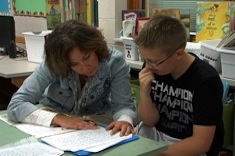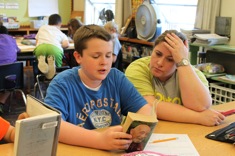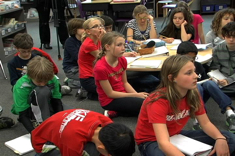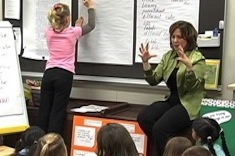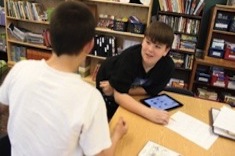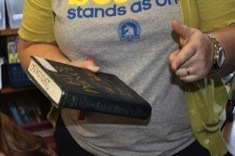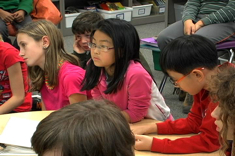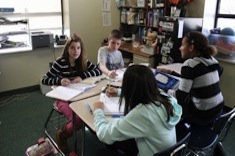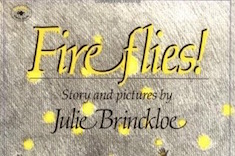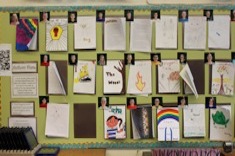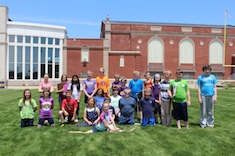5th
Latest Content
Exploring Winter with Short Texts
Middle school teachers Megan Ginther and Holly Mueller focus on winter in short texts as the theme of their December Literacy Contracts in the latest installment of their year-long series.
Curating a Nonfiction Classroom Library
Franki Sibberson writes about how her thinking about nonfiction is changing her classroom library in this first installment of a four-part series.
Powerful Conferences
Ruth Ayres explains how deciding the purpose of conferring in advance can lead to more powerful conferences.
Better Reading Conferences
Katherine Sokolowski describes how she worked over the past few years to initiate better reading conferences.
Thinking About Theme
Karen Terlecky explains how she designs instruction and uses mentor texts to teach theme, and includes a video example of a minilesson.
November Contract: Family and Memoir
The November installment of Megan Ginther and Holly Mueller’s yearlong literacy contract series has a theme of family and memoir.
Two Lessons for Teaching Theme
Franki Sibberson writes about how she chooses books for theme instruction and shares two lessons.
Choice, Content, and Format: Understanding How Boys Write
Katherine Sokolowski is dismayed when many of the boys in her fifth-grade class admit they don’t like to write. She explains how she changed her writing program to meet their needs.
She Wants to Be Katniss for Halloween: Courageous Girls in Books
Shari Frost celebrates a tomboy who finally finds a female character she wants to emulate with a booklist highlighting courageous girls.
Research Book Clubs for Struggling Readers
Beth Lawson finds that a nonfiction research book club is just the grouping structure needed for a group of struggling readers in her fourth-grade classroom.
Exploring Explanatory Moves Writers Use
Jeff Anderson explores the difference between informational and explanatory writing, and what that might mean for teaching craft moves to students.
On the Same Team: Better Parent-Teacher Conferences
Katherine Sokolowski has tips for improving parent conferences by using technology for flexible scheduling and easy follow-up.
The Art of the Book Talk
If you want to match students to books, you’ll need to master the art of the book talk. Katherine Sokolowski has practical tips for honing your skills.
Teaching the Genes
Suzy Kaback rethinks the concept of "managed choice" in writing workshops.
October Literacy Contracts: Fear and Conflict
Megan Ginther and Holly Mueller continue their monthly series on using literacy contracts in middle school. The October literacy contracts have a theme of fear and conflict.
Limiting and Extending Choice in Student Research Projects
When students are able to pick any research topic, they often will choose something they have already studied extensively. How can teachers allow students to pick topics for research they care passionately about and at the same time ensure there is the potential for rich inquiry? Maria Caplin describes the process she uses in her fifth-grade classroom to help students find and refine research topics for deeper learning.
Keeping Kids Safe on the Internet
Julie Johnson provides helpful tips and a letter for parents to help keep students safe on the Internet.
Writing Leads Minilesson
A writing lead is a door — readers will either want to walk through it or shut it and move on to something else. That's the analogy Karen Terlecky uses in this video of a fifth-grade writing workshop minilesson.
Emphasizing Empathy: September Literacy Contracts
Megan Ginther and Holly Mueller are Emphasizing Empathy in their September literacy contracts for middle school students.
Literacy Contracts: Introduction
Megan Ginther and Holly Mueller present Reading Contracts, a system for middle and high school teachers that involves students contracting to complete specific texts and tasks each month.
Using Pinterest for Professional Development
Franki Sibberson finds Pinterest is a useful tool for professional development.
Using Technology to Connect Young Readers and Writers
Julie Johnson reflects on how technology is changing her own reading community, and builds on this knowledge to connect readers and writers in her classroom with others through the Internet.
Reimagining Reading Notebooks
When premade reading notebooks no longer fit into her reading budget, Katherine Sokolowski comes up with a unique design starting with generic notebooks, and in the process figures out what’s most important to include.
First Read Alouds (ROUND-UP)
Choice Literacy contributors share their picks for the first read aloud of the year.
Fireflies and Background Knowledge
Karen Terlecky writes about the importance of building understanding before more complex read alouds.
Using Instagram to Sell Summer Reading Options
Tony Keefer taps into the Instagram craze among his students, and finds it is an ingenious tool for encouraging summer reading while kids are on vacation.
Reflecting All Year Long
Katherine Sokolowski finds the impulse for reflection is strong at the start of summer, but reflection works best when it’s built into routines all year long.
Launching a Fiction Writing Unit with Fifth Graders
Katherine Sokolowski finds late in the year is the perfect time for launching a fiction writing unit with her fifth graders.
Football Field Writing
Katherine Sokolowski adapts an idea from Jim Burke to get her fifth graders outdoors and envisioning their growth over the summer.
Death in Books: Finding Our Way After Loss
Books can help children deal with the toughest challenges in life. In a new booklist, Andie Cunningham shares her top picks for stories about characters grappling with the death of a loved one.
Browse Content By
Type
Category
- Assessment Tools
- Big Fresh Archives
- Booklists
- Choice Numeracy
- Classroom Design
- Common Core
- Community Building
- Conferring
- Content Literacy
- Digital Literacy
- English Language Learners
- Equity
- Family Relations
- Free Samples
- Guiding Groups
- Leadership
- Literacy Coaches
- Mentor Texts
- Minilessons
- New Teacher Mentors
- Podcasts
- Poetry
- Quote Collections
- Reading Strategies
- Self Care
- Struggling and Striving Learners
- Talking and Listening
- Teacher Study Groups
- Teaching Reading
- Teaching Writing
- Word Study and Vocabulary
Author
- Melissa Quimby
- Nawal Qarooni
- Gwen Blumberg
- Julie Cox
- The Lead Learners
- Hannah Tills
- Josie Stewart
- Ruth Metcalfe
- Mallory Messenger
- Becca Burk
- Jodie Bailey
- Vivian Chen
- Mary Brower
- Tiffany Abbott Fuller
- Stephanie Affinito
- Ruth Ayres
- Leigh Anne Eck
- Heather Fisher
- Shari Frost
- Julie Johnson
- Suzy Kaback
- Gigi McAllister
- Shirl McPhillips
- Melanie Meehan
- Cathy Mere
- Debbie Miller
- Tara Barnett and Kate Mills
- Tammy Mulligan
- Dana Murphy
- Bitsy Parks
- David Pittman
- Brenda Power
- Heather Rader
- Matt Renwick
- Mandy Robek
- Christy Rush-Levine
- Gretchen Schroeder
- Jen Schwanke
- Brian Sepe
- Katherine Sokolowski
- Stella Villalba
- Jennifer Vincent
Grade Level
Choice Literacy Membership
Articles
Get full access to all Choice Literacy article content
Videos
Get full access to all Choice Literacy video content
Courses
Access Choice Literacy course curriculum and training



